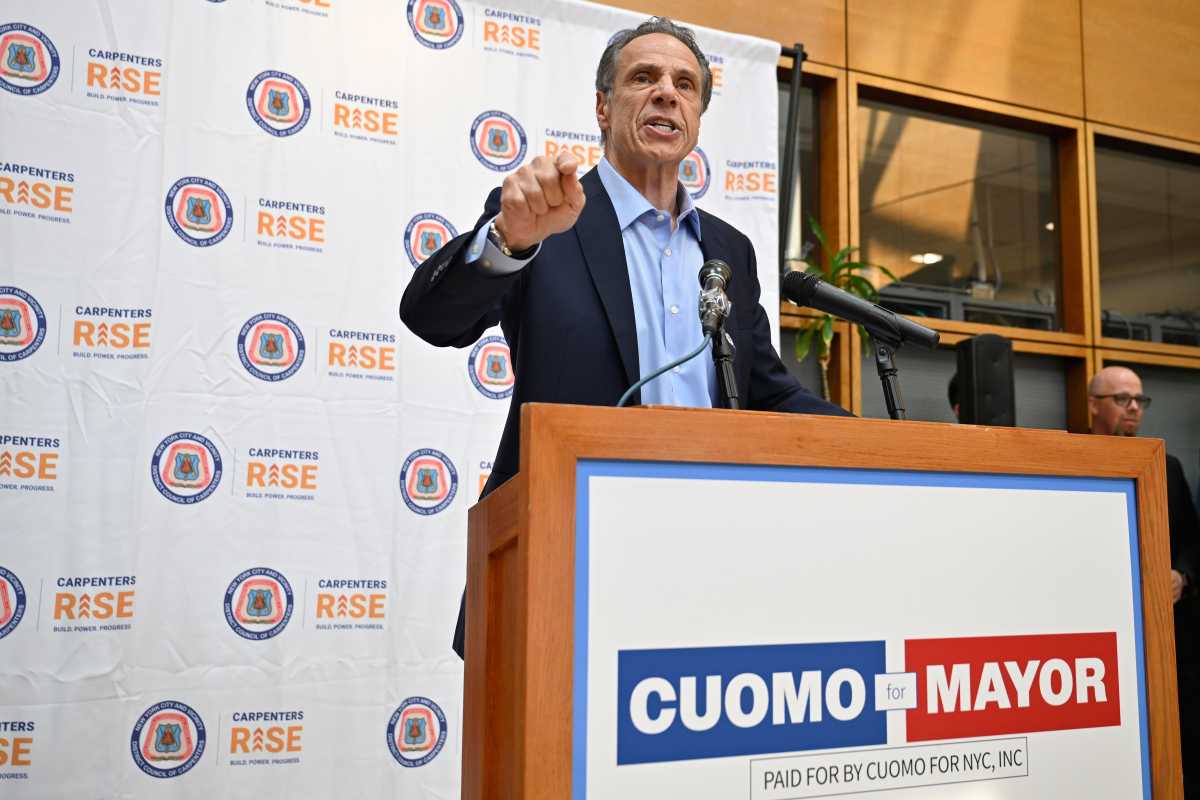To the editor,
I have seen lots of disturbing behavior by players, coaches, referees, parents, fans and reporters in the many years I have attended sports events as a spectator, sports wife and mom.
I ask you, as a Native American descendant of the Mohawk Nation, is it okay to openly hate and treat others in a derogatory manner?
That is the message I got from your headline, “Aviators Crash and Burn as the Federal League Trophy goes to damn Akwesasne Warriors” (online, March 27).
It is my wish that my future generations can enjoy success, and not be verbally degraded for doing so.
Charlene Sunday, Akwesasne, Canada
Editor’s note: We admit to a tiny bit of local boosterism when a Brooklyn team represents our borough on the field (or ice) of play, but we deny that our disappointment at the Aviators’ loss in Canada had anything to do with racism. It is not racist to say that a team named “Warriors” was on the “warpath,” but of course, we congratulate the scrappy Akwesasne squad.
What the Chuck?!
To the editor,
You knew about the Census unless you were living under a rock, but recent complaints about the results make me wonder if Sen. Charles Schumer is senseless (“Census reveals changing borough,” April 1).
The Census Bureau spent billions trying to reach people, including $133 million on an ad campaign which included $2.5 million for Super Bowl commercials.
Every household received several direct mailings. Elected officials also sent out numerous mailings at taxpayers expenses, reaching virtually everyone.
Every daily and weekly newspaper ran editorials and articles, spreading the word free of charge. They all knew how it impacts future representation and distribution of federal aid.
The Census Bureau had access via the Internal Revenue Service, state and city counterparts along with Board of Elections’ own respective mailing lists. They conducted a door-to-door canvas within each Census tract — block by block, building by building. This was followed up by repeat visits to households which didn’t respond.
The operation exceeded even Schumer’s own past vaunted “get out the vote” campaign.
What is left to do? Does Schumer propose we send out marshals to subpoena those people who failed to participate?
Schumer and his ilk are always crying about the potential federal aid we might lose, but — never shy around a camera or a microphone — he is now strangely silent about looking at how all municipal agencies manage their respective share of $6 billion-plus in regular formula federal aid, supplemented by billions of dollars more in American Reinvestment and Recovery Act stimulus funding.
Larry Penner, Great Neck, LI
***
To the editor,
Why is Mayor Bloomberg beside himself over the census count when he was responsible for it.
Illegal aliens clearly didn’t want to be counted.
Bloomberg in his infinite wisdom and unbelievable generosity with our hard-earned money welcomed these people and their families to our fair and overcrowded city, where services are being cut everyday, threats of layoffs loom for teachers, firehouses are being closed, the police force is the smallest it has been in years and there’s more garbage than ever for New York’s strongest to pick up.
We pay more and get less because so many others come here and get a free ride.
The state and the federal government will now give less funding to New York City because of this undercount. I know the census workers were on the ball because they came to my house three times on three different days.
It reminds me of the scene from “Animal House” when one of them was getting paddled during a fraternity initiation, except here it’s Emperor Bloomberg telling us to “assume the position” as we thank him, and ask for more.
Maureen Parker, Marine Park
‘Typhoid Mary’
To the editor,
I’ve always knew that Sen. Carl Kruger (D–Mill Basin) was a crook (“Kruger sighting! Embattled senator shows up at annual breakfast,” online, March 28).
His sexuality just spices the story with no real relevance to his crimes.
There were millions of words to describe his action, but “political Typhoid Mary?”
That insults even me as a law-abiding gay man.
Your paper is better than that.
Christopher Smyth, Marine Park
Book-worms
To the editor,
I went to the Brooklyn Heights library to pick up some tax forms a couple of weeks ago, and saw some DVDs that interested me, so I checked them out.
I was pleasantly surprised when the library employee said, “Thank you,” after scanning them.
Perhaps I’m old fashioned, but I like it when employees show their appreciation for my business, even if in this case no money was exchanged. Still, this employee might have realized that library patrons are also taxpayers, who pay her wages, and provide and maintain her job.
My recent trip was completely different. I had three books to check out at the same branch, but this time the employee merely said, “Here,” as she pushed the books at me.
When it seemed she wasn’t going to say “thank you,” I said to her, “Gee, I was hoping for a ‘thank you.’ ”
She replied, “No, you’re supposed to thank me.”
The impression this employee gave me was that she was serving me only at her sufferance, and felt that she was doing me a favor for which I should humbly thank her.
I would had demanded to speak to her supervisor were I not pressed for time, so I left feeling disgusted.
Should Brooklyn Public Library employees thank patrons or should patrons thank them?
I’m still puzzled.
Alton Yee, Brooklyn Heights
Blog-tastic
To the editor,
I don’t think last year’s Blogfest was a debacle, and I was not pleased to hear your reporter refer to it as such (“Blogfest heading back to the future,” April 1).
The annual gathering of Brooklyn bloggers is always feisty and fun, but some people were not pleased by our sponsorship by Absolut Brooklyn, even though many enjoyed the free admission, free drinks, food and special guests.
This year’s Blogfest at The Bell House on May 12 is a return to basics with a great keynote speaker, Jeff Jarvis, of Buzzmachine.com.
He will talk about how to make money as a blogger, a subject near and dear to many.
Louise Crawford, Park Slope
The writer is the author of the website, “Only the Blog Knows Brooklyn.”
Regulate bikes
To the editor,
The feasibility of adding bicycle lanes on our streets is a big topic of discussion, but one aspect is routinely avoided: What will the city get in return for placing bicyclists on the same level as motorists (“Car ban is wheel?” April 1).
Motorists pay dearly for their right to use city streets and parking spaces. They pay heavy sales taxes when they purchase their vehicles. They pay taxes every time they buy gasoline and supplies, or make repairs to their vehicles. They are subjected to heavy fines for violations, and they are required to carry liability insurance if they injure pedestrians.
What do bicyclists pay in comparison? Nothing.
If they want their vehicles to have the same rights and benefits as motorists, they must pay for them.
I am not anti-bicycle, but we see bicyclists riding on our sidewalks, skimming by pedestrians who are unaware that they are in danger of being hit from the rear.
Each bicycle should have a bell or some other sound device to alert walkers.
Bicyclists are increasing, exponentially, and the time has now come to have them regulated as everything else is in a heavily-populated area.
Edward Goldsmith, Gravesend
Wrong words
To the editor,
I am objecting to the words put in my mouth by your reporter that I have absolutely no recollection of saying (“Carl crashes confab,” March 31).
The expression, “not getting out of bed in the morning,” is not something I use.
What I do distinctly remember is your reporter asking me if I had seen the senator eat something at the breakfast, and I responded that I had no idea if he had, and that I wasn’t watching what anyone ate. I said that I had seen him standing near the back of the entrance area to the ballroom with Councilman Mike Nelson (D–Sheepshead Bay).
I really don’t deal much with Sen. Kruger or his office, have no opinion about his case nor know anything more about the details other than what I read in the papers.
Joel Schnur, Midwood
The writer is a lobbyist with Schnur Associates in Manhattan.
Class probe
To the editor,
I think school administrator Pat Mannino’s investigation of false addresses, regarding kindergarten seats at PS 107, is interesting (“Slope kinder crisis,” April 1).
How many parents at the sought-after PS 321 lie about their address to get in? How does this happen?
I know of six people who used this tactic to get out of PS 282. In fact, at one time the president of the Parent-Teacher Association lied about her address because she was living out of the district.
Nobody says boo about this egregious activity.
Dawn Dew, Park Slope
Goose-icide is inhuman
To the editor,
On July 8, 2010, biologists and technicians from the Department of Agriculture entered Prospect Park and rounded up the park’s entire population of approximately 400 Canada geese, proceeding to gas the birds to death, and then deposit the bodies in a landfill (“Feds kill hundreds of Prospect Park geese!” online, July 12, 2010).
The government intends to kill thousands more geese, despite the various protests and a vigil.
My four-year-old son regularly saw these geese, including the goslings as we live three blocks from the park, and asked his mother at the vigil, “Why did they kill the geese?”
The simple answer is because they posed a danger to aircraft, as geese have collided with airplanes. As Mayor Bloomberg put it: “It’s geese or human beings — I can tell you where I come out on that.”
As psychologists, however, we believe that the reason the geese were killed actually has much more to do with a very different danger: the human psyche.
Humans have a natural tendency to classify certain types of animals and people into different categories, and our culture teaches us whom to place in these groups. We learn that some groups are worthy of compassion, while others are not.
We doubt that the government’s first response would have been to gas 400 animals to death if puppies, instead of geese, were involved.
Our preferential treatment toward certain animals is not because dogs, for instance, can suffer more than other animals, it is because humans have learned to decide, often arbitrarily, who should matter and who should not.
If, for example, dogs were placed in cages in which they could not even turn around, people would be outraged; yet pigs, regarded as more intelligent than dogs, are treated precisely this way. Billions of “factory farmed” animals are legally treated in a manner that would violate the very basic animal cruelty laws that protect dogs and cats.
It is illustrative that the government’s first response in Prospect Park was to use lethal violence, despite the existence of many humane options. Among the many alternatives are relocating geese away from airports, and placing oil on the eggs to prevent more from hatching. Canadian aviation authorities, who are familiar with both Canada geese and bird collisions with aircraft, use lights and sound cannons to disperse the birds, and they plant tall grass that the geese dislike in airports. Our North American neighbors’ approach reflects the view that while of course protecting humans is imperative, the geese’s lives actually matter.
In “Why We Love Dogs, Eat Pigs, and Wear Cows,” Dr. Melanie Joy discusses how humane people are able to participate in inhumane practices without realizing what they are doing. Dr. Joy’s research suggests that while most of us care about animals and don’t want them to suffer, we are socialized by an invisible belief system — carnism — that teaches us to block our awareness and shut down our empathy toward species we have learned to think of as edible.
We believe a similar belief system is at work allowing us to support the geese killings.
Another researcher, Dr. Jonathan Haidt of Princeton University, has done work which can also help explain our inconsistent attitudes toward animals. Dr. Haidt believes that human morality is based upon five principles, three of which are relevant here.
One is our ability to care about and minimize the pain of others. Another involves caring about rights for all. Those who sympathize with the geese utilize these two principles.
A third moral principle, however, is very different because it involves commitment to one’s own group only. Basically, we seek to protect our group from perceived threats, stemming from our nature as a tribal species. Those without sympathy for the geese may be emphasizing this last moral principle, and downplaying the first two involving concern for all.
Sometimes, loyalty to one’s own group can blind us to the welfare of others. We believe the geese paid the price for that particular human trait with their lives.
As state Sen. Eric Adams remarked at the vigil for the geese: “This is going to judge our characters as human beings. We must protect the entire race, and that includes the race of animals as well.”
If we disregard the importance of animals’ rights to live without suffering — or even just to live — because we have categorized them as an unworthy group, it may ease our consciences, but in reality it does nothing to reduce their pain or plight.
Stephen Shainbart, Park Slope, and Melanie Joy, Boston
























